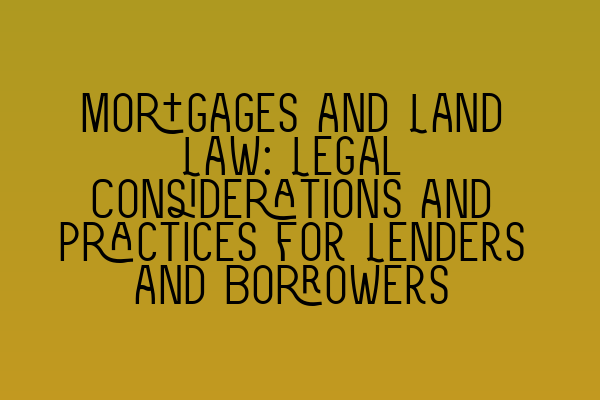Mortgages and Land Law: Legal Considerations and Practices for Lenders and Borrowers
When it comes to property transactions, mortgages are an essential element of the process. As a solicitor specializing in property law at SQE Property Law & Land Law, I often encounter questions and concerns from both lenders and borrowers about the legal considerations and practices involved in mortgages. In this blog post, we will explore the key aspects of mortgages and land law, highlighting important legal factors that lenders and borrowers should be aware of.
Understanding Mortgages
A mortgage is a type of loan secured against a property. It allows individuals or businesses to borrow money from a lender to finance the purchase of a property. The property itself serves as collateral for the loan, providing security for the lender in the event of default by the borrower. It’s important for lenders to thoroughly evaluate the borrower’s creditworthiness and conduct proper due diligence on the property before granting a mortgage.
For borrowers, obtaining a mortgage can be a complex and daunting process. It’s crucial to understand the responsibilities and obligations associated with taking on a mortgage, as failure to comply with the terms of the loan can lead to serious legal consequences, including foreclosure.
The Role of Lenders
As a lender, it’s essential to have a comprehensive understanding of land law and the various legal considerations involved in mortgage transactions. This includes conducting thorough property searches, ensuring compliance with regulatory requirements, and preparing accurate and legally binding mortgage agreements.
One of the key legal considerations for lenders is ensuring that the mortgage is properly registered with the Land Registry. This provides legal protection and priority for the lender’s interest in the property. Failing to register the mortgage can result in loss of priority and potential disputes with other creditors or subsequent purchasers.
Furthermore, lenders must carefully assess the borrower’s ability to repay the loan. Conducting a thorough affordability assessment and obtaining documentation to verify the borrower’s income and financial stability is crucial to minimize the risk of defaults.
To effectively market and sell mortgage products, lenders should also focus on search engine optimization (SEO) strategies to ensure their offerings are easily discoverable online. This includes optimizing website content with relevant keywords such as ‘mortgages’ and ‘land law,’ as well as utilizing link building strategies to enhance their online presence.
For lenders looking to expand their knowledge of property law and land law, SQE Property Law & Land Law offers comprehensive preparation courses for the Solicitors Qualifying Examination (SQE). These courses cover essential topics such as mortgages, land law, and other key areas of property law.
The Responsibilities of Borrowers
As a borrower, it’s important to be fully aware of the legal responsibilities and obligations associated with obtaining a mortgage. This includes understanding the terms and conditions of the mortgage agreement, making regular payments, and ensuring compliance with the lender’s requirements.
Before entering into a mortgage agreement, borrowers should conduct thorough research on property prices, interest rates, and available mortgage options. Comparing different lenders and seeking independent legal advice can help borrowers make informed decisions and select the most suitable mortgage for their needs.
Borrowers should also prioritize maintaining a good credit rating and making timely mortgage payments. Failure to repay the loan as agreed could result in default and potential foreclosure proceedings by the lender. Seeking professional advice in case of financial difficulties can help borrowers navigate these challenging situations and explore possible alternatives to foreclosure.
If you’re preparing for the Solicitors Qualifying Examination (SQE) and need practice exam questions or Mocks for SQE 1, SQE Property Law & Land Law offers SQE 1 Practice Exam Questions and SQE 1 Practice Mock Exams (FLK1 FLK2). These resources are designed to help you enhance your knowledge and test your understanding of property law, including mortgages and land law.
In Conclusion
Mortgages play a significant role in property transactions, providing individuals and businesses with the means to finance property purchases. Whether you are a lender or a borrower, it’s crucial to understand the legal considerations and practices involved in mortgages and land law.
By familiarizing yourself with the responsibilities and obligations associated with mortgages, conducting proper due diligence, and seeking professional guidance when needed, you can navigate the mortgage process with confidence and minimize the risk of legal disputes. For lenders looking to expand their reach and optimize their online presence, incorporating effective SEO strategies can help drive traffic and potential leads to their mortgage offerings.
For more information on SQE preparation courses or to explore specific topics related to mortgages, land law, and other areas of property law, visit SQE Property Law & Land Law. Our courses and resources are designed to support aspiring solicitors in their journey towards becoming qualified legal professionals.
Related Articles:
SQE 1 Practice Exam Questions
SQE 1 Practice Mocks FLK1 FLK2
SQE 2 Preparation Courses
SQE 1 Preparation Courses
SRA SQE Exam Dates
